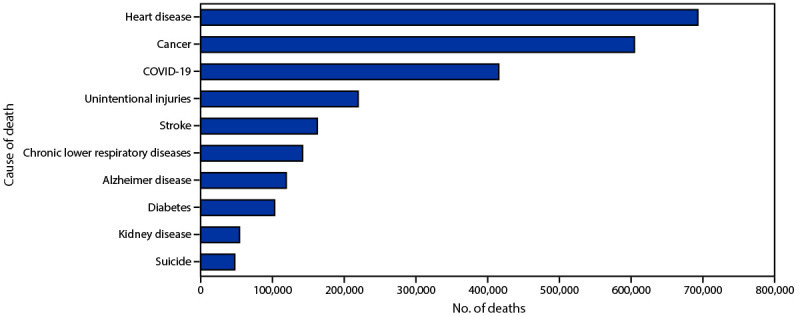In my view, medical misinformation is a leading cause of death in the United States, particularly as it relates to the COVID-19 pandemic and vaccinations.
For 2021, the official leading causes of U.S. deaths were heart disease, cancer, COVID-19, unintentional injuries and stroke:
Source: Morbidity and Mortality Weekly Report - Centers for Disease Control and Prevention
These leading causes are unchanged in recent years except that COVID-19 is new starting in 2020. It was the third leading cause of U.S. death in 2020, 2021 and 2022:
Source: Peterson Center on Healthcare and Kaiser Family Foundation
In early 2020, COVID-19 was first reported to cause a pneumonia-like illness and caused ~ 340,000 deaths in 2020. The initial public health response was based on restricting travel and large gatherings, general infection control measures (identify and isolate, cleaning and disinfection), physical distancing and the use of personal protective equipment (i.e. masks).
However, the pandemic was politicized from the start, initially by President Trump and later by Republican politicians:
President Donald Trump initially downplayed the threat posed by COVID-19 and compared it to the flu in public remarks.9 The President also labeled it a “new hoax” [and said that] “the Democrats are politicizing the coronavirus—they're politicizing it.”10 President Trump also promoted claims that the virus could be combatted by injecting or drinking disinfectant or bleach, and promoted hydroxychloroquine as a cure.11, 12 He also appeared in public without a mask and criticized his rival for the presidency, Joe Biden, for wearing one: “Did you ever see a man that likes a mask as much as him?… If I were a psychiatrist, I'd say this guy has some big issues.”13Source: Politicization and COVID-19 vaccine resistance in the U.S., 2022
In December 2020, COVID-19 vaccines became available, but a large percentage of the population resisted getting any vaccines, much less the recommended series, based on a changing series of medical misinformation or myths.
This is not politics as usual. This politicizing of public health is associated with higher death rates (i.e. it kills people). Covid death rates are higher among Republicans than Democrats, which appears to be due to lower vaccination rates and less use of masking and social distancing.
The problem is so serious that in early 2021, Surgeon General Vivek H. Murthy, M.D., M.B.A. issued an advisory on medical misinformation:
I am urging all Americans to help slow the spread of health misinformation during the COVID-19 pandemic and beyond. Health misinformation is a serious threat to public health. It can cause confusion, sow mistrust, harm people’s health, and undermine public health efforts. Limiting the spread of health misinformation is a moral and civic imperative that will require a whole-of-society effort.Medical misinformation is not just “people who like to talk” - it changes peoples’ behavior, and in a public health crisis, it can contribute to the spread of disease and cause large numbers of unnecessary deaths:
It’s easy to forget that health misinformation, including about Covid, can still contribute to people not getting vaccinated or creating stigmas,” said Megan Marrelli, the editorial director of Meedan, a nonprofit focused on digital literacy and information access. “We know for a fact that health misinformation contributes to the spread of real-world disease.” New York Times, 28Dec22People have always spouted medical nonsense. What is new today is that prominent public officials, physicians and other “influencers” are telling medical lies that result in large numbers of deaths without feeling any shame or need to correct their behavior.
In addition, social media and changing communication styles have amplified the effect of this misinformation:
Pre-Covid, people who believed in medical misinformation were generally just talking to each other, contained within their own little bubble, and you had to go and do a bit of work to find that bubble,” she said. “But now, you don’t have to do any work to find that information — it is presented in your feed with any other types of information. New York Times, 28Dec22What should our personal response be to medical misinformation about COVID-19, vaccines and other important health issues?
First, we should educate ourselves with the best science and health information available by using responsible sources and rejecting sources with a history of indifference to the truth. Sources that have proclaimed that COVID-19 is a myth or that vaccines are inherently dangerous cannot be trusted.
Second, we should set a good example to others by demonstrating appropriate personal behavior regarding COVID-19, vaccinations and other medical or public health issues.
Third, we should make an active effort to “stay away from evil” by not supporting, and, to the extent possible, avoiding individuals, media and other institutions who promote medical misinformation. Instead, we should support individuals and institutions who articulate rational medical and public health statements and activities.
Public officials have an important role in combating this “health infodemic” of medical misinformation, but we have an important job too in improving our own behavior. Let’s get to work!





